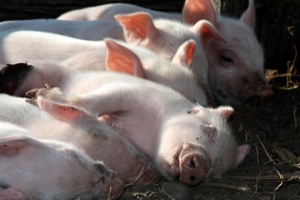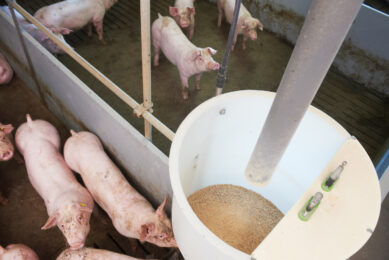RESEARCH: Zinc oxide hybrid has positive effects in weanling pigs

Adding a montmorillonite-zinc oxide hybrid to diets for weaned pigs was shown to have positive effects on growth performance and animal health.
These results were achieved by researchers from the Chinese Institute of Feed Science at Zhejiang University.
Montmorillonite
Montmorillonite is an organic clay and when incorporated with zinc oxide a montmorillonite-zinc oxide hybrid (MMT-ZnO) is formed.
A dietary addition of 500 mg/kg of Zn from MMT-ZnO was shown to be comparable to 2,000 mg/kg of Zn from ZnO while more effective than MMT or 500 mg/kg of Zn from ZnO for enhancing growth performance, alleviating diarrhoea, as well as improving intestinal microflora, mucosal barrier integrity and morphology of weaned pigs.
Trial set-up
For the trial a total of 180 piglets (Duroc × Landrace × Yorkshire, average initial weight of 7.2 kg, and weaned at about 27 days) were randomly allotted to five groups for two weeks, each of which had six pens with six pigs per pen.
The dietary treatments were:
• basal control diet, 100 mg/kg of supplemental Zn as ZnSO4;
• basal diet + 2.0 g/kg montmorillonite (MMT), equivalent to the MMT in the MMT-ZnO treatment;
• basal diet + 500 mg/kg of Zn as ZnO;
• basal diet + 500 mg/kg of Zn as MMT-ZnO;
• basal diet + 2,000 mg/kg of Zn as ZnO.
Results
The results showed that supplemental 500 mg/kg of Zn from MMT-ZnO or 2,000 mg/kg of Zn from ZnO…
• improved average daily gain and daily feed intake,
• decreased faecal scores at seven and 14 days post-weaning,
• reduced plasma d-lactate and diamine oxidase activity,
• improved villus height and the villus height:crypt depth ratio at the jejunal mucosa
…as compared with the control, MMT or 500 mg/kg of Zn from ZnO.
Pigs fed with 500 mg/kg of Zn as MMT-ZnO had lower plasma levels of d-lactate than those fed with 2000 mg/kg of Zn as ZnO.
Pigs fed with 500 mg/kg of Zn as MMT-ZnO had lower number of intestinal Clostridium and Escherichia coli than those fed with the control, MMT or 500 mg/kg of Zn as ZnO.
Supplementation with 2000 mg/kg of Zn as ZnO reduced the number of Clostridium in proximal colon as compared with the control while had no influence on intestinal E. coli.
Supplemental MMT or 500 mg/kg of Zn from ZnO had no effect on growth performance, intestinal microflora, permeability and morphology as compared to the control group.
The research is published in Elsevier Science’s Animal Feed Science and Technology.











